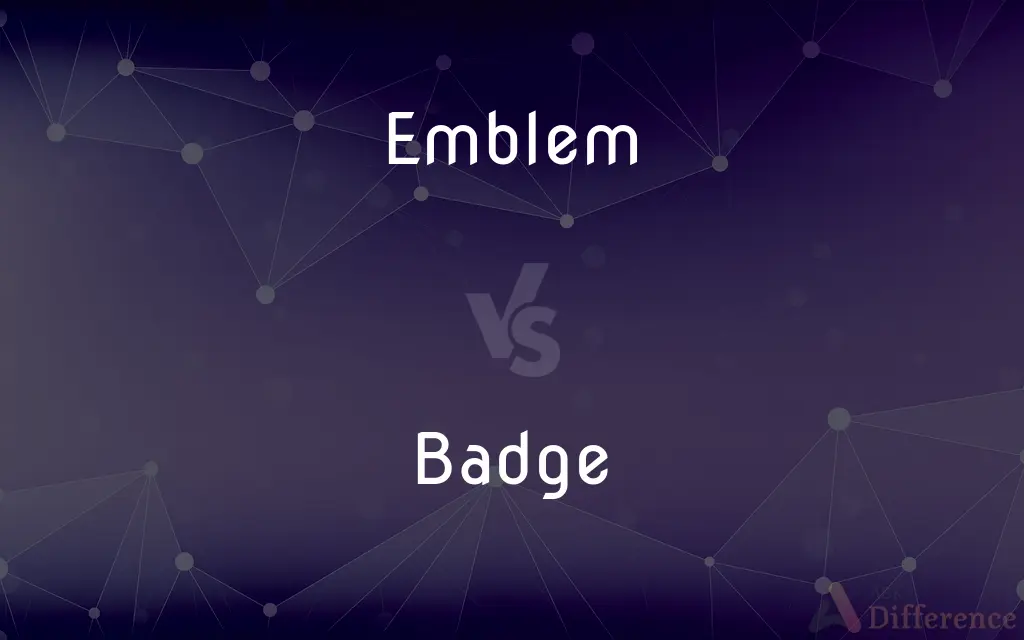Emblem vs. Badge — What's the Difference?
By Maham Liaqat & Fiza Rafique — Updated on April 1, 2024
An emblem is a symbolic design representing a concept, group, or nation, while a badge is a distinctive mark or token signifying membership, authority, or achievement.

Difference Between Emblem and Badge
Table of Contents
ADVERTISEMENT
Key Differences
An emblem often embodies abstract ideas or identity, serving as a visual representation of values, traditions, or allegiances. On the other hand, a badge typically signifies an individual's association with an organization, rank, or achievement, often worn as a mark of identity or authority.
Emblems are usually more complex in design, incorporating various elements to convey deeper meanings or stories related to a nation, organization, or group. Whereas badges are more straightforward, focusing on identification or qualification, and are designed for immediate recognition.
While emblems can be found in various forms, such as logos, flags, or seals, representing broader concepts or entities, badges are physical objects that individuals carry or display, emphasizing personal identification or achievement.
Emblems serve a broader symbolic purpose, often aiming to unite people under common values or heritage. In contrast, badges are more personal, serving as proof of belonging, authority, or accomplishment in specific contexts.
Both emblems and badges play significant roles in culture and society, but they differ in scope and application. Emblems often have a wider, more abstract significance, while badges are more narrowly focused on individual recognition or authority.
ADVERTISEMENT
Comparison Chart
Purpose
Symbolizes ideas, values, or identity
Signifies membership, authority, or achievement
Design
Complex, conveying deeper meanings
Straightforward, designed for immediate recognition
Form
Can be logos, flags, seals, etc.
Physical objects worn or displayed
Scope
Broader, representing groups, nations, or concepts
Personal, emphasizing individual identity or status
Symbolic Value
Aims to unite or represent collective identities
Serves as proof of belonging or qualification
Compare with Definitions
Emblem
A figure or symbol representing particular qualities or values.
A lion is often used as an emblem of courage.
Badge
A token or insignia of a specific achievement or qualification.
Scouts earn badges as recognition of new skills.
Emblem
An abstract representation of concepts or allegiances.
The peace symbol has become an emblem of anti-war movements.
Badge
A symbol worn to indicate affiliation with an organization.
Conference attendees wear badges to display their participant status.
Emblem
A visual symbol embodying group or national identity.
The red cross is an emblem of medical aid and humanitarian assistance.
Badge
A physical representation of personal accomplishment.
Marathon runners often receive badges as proof of completion.
Emblem
A symbolic design representing an idea or entity.
The bald eagle is an emblem of the United States' strength and freedom.
Badge
An emblematic device signifying a special status.
Military personnel wear badges to denote rank and specializations.
Emblem
A logo or seal associated with a specific organization.
The Olympic rings serve as an emblem for the International Olympic Committee.
Badge
A mark of identification worn to signify authority or membership.
Police officers wear badges to denote their authority and role.
Emblem
An emblem is an abstract or representational pictorial image that represents a concept, like a moral truth, or an allegory, or a person, like a king or saint.
Badge
A badge is a device or accessory, often containing the insignia of an organization, which is presented or displayed to indicate some feat of service, a special accomplishment, a symbol of authority granted by taking an oath (e.g., police and fire), a sign of legitimate employment or student status, or as a simple means of identification. They are also used in advertising, publicity, and for branding purposes.
Emblem
A distinctive badge, design, or device
Trucks marked with the company emblem.
The emblem of the air force.
Badge
A device or emblem worn as an insignia of rank, office, or membership in an organization.
Emblem
An object or representation that functions as a symbol
"a bed of sweet-scented lilies, the emblem of France" (Amy Steedman).
Badge
An emblem given as an award or honor.
Emblem
An allegorical picture usually inscribed with a verse or motto presenting a moral lesson.
Badge
A characteristic mark or indicative trait
“Indifference to what others think is ... the badge of the aristocrat” (Elspeth Huxley).
Emblem
A representative symbol, such as a trademark or logo.
Badge
A distinctive mark, token, sign, emblem or cognizance, worn on one's clothing, as an insignia of some rank, or of the membership of an organization.
The badge of a society; the badge of a policeman
Emblem
Something that represents a larger whole.
The rampant poverty in the ethnic slums was just an emblem of the group's disenfranchisement by the society as a whole.
Badge
A small nameplate, identifying the wearer, and often giving additional information.
Emblem
Inlay; inlaid or mosaic work; something ornamental inserted in a surface.
Badge
A card, sometimes with a barcode or magnetic strip, granting access to a certain area.
Emblem
A picture accompanied with a motto, a set of verses, etc. intended as a moral lesson or meditation.
Badge
Something characteristic; a mark; a token.
Emblem
To symbolize.
Badge
A brand on the hand of a thief, etc.
Emblem
Inlay; inlaid or mosaic work; something ornamental inserted in a surface.
Badge
(nautical) A carved ornament on the stern of a vessel, containing a window or the representation of one.
Emblem
A visible sign of an idea; an object, or the figure of an object, symbolizing and suggesting another object, or an idea, by natural aptness or by association; a figurative representation; a typical designation; a symbol; as, a balance is an emblem of justice; a scepter, the emblem of sovereignty or power; a circle, the emblem of eternity.
Badge
(heraldry) A distinctive mark worn by servants, retainers, and followers of royalty or nobility, who, being beneath the rank of gentlemen, have no right to armorial bearings.
Emblem
A picture accompanied with a motto, a set of verse, or the like, intended as a moral lesson or meditation.
Badge
(GUI) A small overlay on an icon that shows additional information about that item, such as the number of new alerts or messages.
Emblem
To represent by an emblem; to symbolize.
Emblemed by the cozening fig tree.
Badge
An icon or emblem awarded to a user for some achievement.
When you have checked in to the site from ten different cities, you unlock the Traveller badge.
Emblem
Special design or visual object representing a quality, type, group, etc.
Badge
(slang) A police officer.
That's why every badge back home wanted to nail him.
Emblem
A visible symbol representing an abstract idea
Badge
(transitive) To mark or distinguish with a badge.
The television was badged as 'GE', but wasn't made by them.
Badge
(transitive) To show a badge to.
He calmed down a lot when the policeman badged him.
Badge
(ambitransitive) To enter a restricted area by showing one's badge.
Badge
A distinctive mark, token, sign, or cognizance, worn on the person; as, the badge of a society; the badge of a policeman.
Badge
Something characteristic; a mark; a token.
Sweet mercy is nobility's true badge.
Badge
A carved ornament on the stern of a vessel, containing a window or the representation of one.
Badge
To mark or distinguish with a badge.
Badge
An emblem (a small piece of plastic or cloth or metal) that signifies your status (rank or membership or affiliation etc.);
They checked everyone's badge before letting them in
Badge
Any feature that is regarded as a sign of status (a particular power or quality or rank);
Wearing a tie was regarded as a badge of respectability
Badge
Put a badge on;
The workers here must be badged
Common Curiosities
Are badges only physical objects?
Primarily, yes. Badges are physical objects designed for wear or display to signify certain affiliations, achievements, or authorities.
Why are emblems important in culture?
Emblems are important for embodying and promoting collective identities, values, and traditions, often serving as unifying symbols for groups or nations.
How are badges used in the military?
In the military, badges are used to denote rank, specialization, and achievements, serving as important identifiers and honors.
Can an emblem also be a badge?
While an emblem and a badge serve different symbolic purposes, an emblem can be incorporated into a badge as part of its design to denote specific symbolism or authority.
Do badges confer any legal authority?
Yes, some badges, especially those used by law enforcement or government officials, confer legal authority and are recognized by law.
Can the design of an emblem change over time?
Yes, the design of an emblem can evolve to reflect changes in the values, identity, or aspirations of the group it represents.
Why might someone wear a badge with pride?
Individuals might wear badges with pride to signify personal achievements, memberships, or authority that they value highly.
What is an emblem?
An emblem is a symbolic figure or design that represents an idea, value, nation, or organization.
How does a badge differ from an emblem?
A badge is a distinctive mark or token worn to signify membership, authority, or achievement, focusing on individual identification, unlike the broader symbolic nature of emblems.
What signifies an emblem as a national symbol?
An emblem becomes a national symbol when it is widely recognized and accepted as representing the nation's values, heritage, or identity.
How do organizations choose their emblems?
Organizations choose their emblems based on what best represents their values, mission, and identity, often incorporating symbols with relevant meanings.
Can an emblem be a part of a nation’s flag?
Yes, emblems are often a central part of a nation's flag, symbolizing the nation’s identity and values.
What is the significance of badges in scouting?
In scouting, badges represent achievements and the acquisition of new skills, serving as milestones for personal development.
What makes a good badge design?
A good badge design is clear, recognizable, and effectively conveys the authority, achievement, or affiliation it signifies.
Are emblems protected by copyright?
Yes, emblems, especially those representing organizations, nations, or brands, can be protected by copyright or trademark law.
Share Your Discovery

Previous Comparison
Image vs. Visual
Next Comparison
Promotional vs. PromotionAuthor Spotlight
Written by
Maham LiaqatCo-written by
Fiza RafiqueFiza Rafique is a skilled content writer at AskDifference.com, where she meticulously refines and enhances written pieces. Drawing from her vast editorial expertise, Fiza ensures clarity, accuracy, and precision in every article. Passionate about language, she continually seeks to elevate the quality of content for readers worldwide.














































